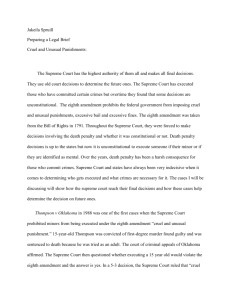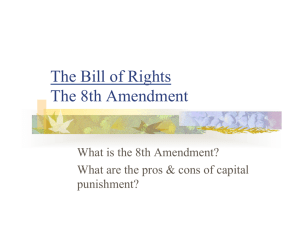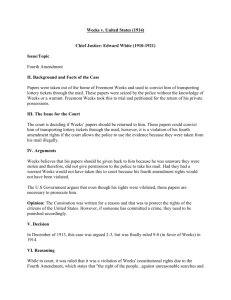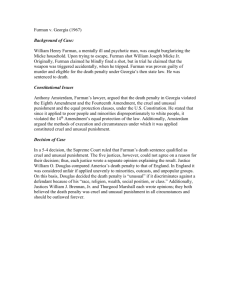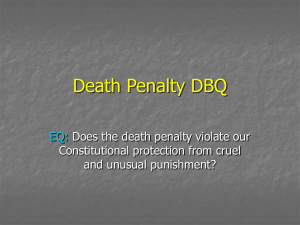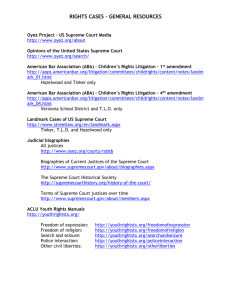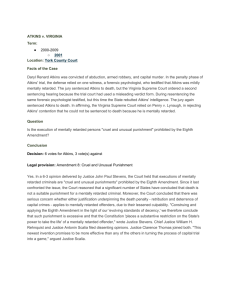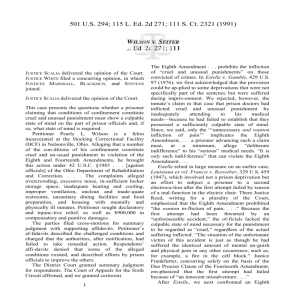File
advertisement
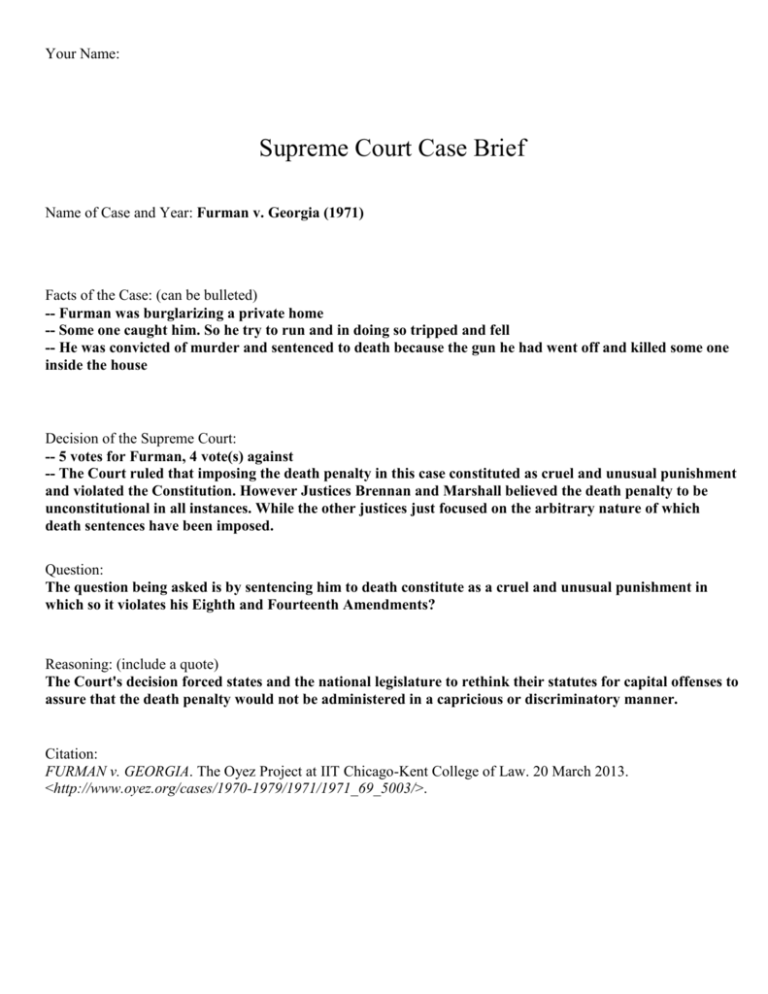
Your Name: Supreme Court Case Brief Name of Case and Year: Furman v. Georgia (1971) Facts of the Case: (can be bulleted) -- Furman was burglarizing a private home -- Some one caught him. So he try to run and in doing so tripped and fell -- He was convicted of murder and sentenced to death because the gun he had went off and killed some one inside the house Decision of the Supreme Court: -- 5 votes for Furman, 4 vote(s) against -- The Court ruled that imposing the death penalty in this case constituted as cruel and unusual punishment and violated the Constitution. However Justices Brennan and Marshall believed the death penalty to be unconstitutional in all instances. While the other justices just focused on the arbitrary nature of which death sentences have been imposed. Question: The question being asked is by sentencing him to death constitute as a cruel and unusual punishment in which so it violates his Eighth and Fourteenth Amendments? Reasoning: (include a quote) The Court's decision forced states and the national legislature to rethink their statutes for capital offenses to assure that the death penalty would not be administered in a capricious or discriminatory manner. Citation: FURMAN v. GEORGIA. The Oyez Project at IIT Chicago-Kent College of Law. 20 March 2013. <http://www.oyez.org/cases/1970-1979/1971/1971_69_5003/>. Your Name: Supreme Court Case Brief Name of Case and Year: Atkins v. Virginia (2002) Facts of the Case: (can be bulleted) Daryl Renard Atkins was convicted of abduction, armed robbery, and capital murder. In the penalty phase of the defense relied on one witness, a forensic psychologist, who testified that Atkins was mildly mentally retarded. The jury sentenced Atkins to death, but Virginia Supreme Court ordered a second sentencing hearing since the court had used misleading verdict form. During resentencing the forensic psychologist testified, but this time the State rebutted Atkins' intelligence. And the jury again sentences him to death. But because of Penry v. Lynaugh, he could not be sentenced to death because he was mentally retarded. Decision of the Supreme Court: 6 votes for Atkins, 3 vote(s) against Yes. The Court held that executions of mentally retarded criminals are "cruel and unusual punishments" and are prohibited by the Eighth Amendment. Since it last confronted the issue, the Court reasoned that a significant number of States have concluded that death is not a suitable punishment for a mentally retarded criminal. Such a punishment would be excessive and wouldn’t be morally right against a mentally retarded criminal Question: -- Is the execution of a mentally retarded persons a "cruel and unusual punishment" and is it prohibited by the Eighth Amendment? Reasoning: (include a quote) We therefore conclude that such punishment is excessive and that the Constitution 'places a substantive restriction on the State's power to take the life' of a mentally retarded offender Citation: ATKINS v. VIRGINIA. The Oyez Project at IIT Chicago-Kent College of Law. 20 March 2013. <http://www.oyez.org/cases/2000-2009/2001/2001_00_8452/>. Your Name: Supreme Court Case Brief Name of Case and Year: Roper v. Simmons (2005) Facts of the Case: (can be bulleted) -- Christopher Simmons was sentenced to death in 1993, he was only 17. -- Appeals to state and federal courts lasted until 2002, but each appeal was rejected. -- But in 2002, the Missouri Supreme decided to hear his appeal again because of the decision in Atkins v. Virginia, -- Using the reasoning from the Atkins case, the Missouri court decided, 6-to-3, that the U.S. Supreme Court's 1989 decision in Stanford v. Kentucky, which held that executing minors was not unconstitutional was no longer valid. -- Stanford v. Kentucky relied on that majority of Americans did not consider the execution of minors to be cruel and unusual. But since then many laws have been passed limiting the scope of the death penalty, -- The majority of Americans were now opposed to the execution of minors, the court held that such executions were now unconstitutional. Decision of the Supreme Court: 5 votes for Simmons, 4 vote(s) against Yes. The Court ruled that standards of decency have evolved so that executing minors is "cruel and unusual punishment" and it’s prohibited by the Eighth Amendment. The majority cited a consensus against the juvenile death penalty and its own determination that the death penalty is a disproportionate punishment for minors. Finally the Court pointed to "overwhelming" international opinion against the juvenile death penalty. Question: Does the execution of minors violate the prohibition of "cruel and unusual punishment" found in the Eighth Amendment and applied to the states through the incorporation doctrine of the 14th Amendment? Reasoning: (include a quote) The death penalty is a disproportionate punishment for minors Citation: ROPER v. SIMMONS. The Oyez Project at IIT Chicago-Kent College of Law. 20 March 2013. <http://www.oyez.org/cases/2000-2009/2004/2004_03_633/>. Your Name: Supreme Court Case Brief Name of Case and Year: Francis v. Wesrebber (1947) Facts of the Case: (can be bulleted) Francis, a 16-year-old black youth, was convicted of murder in Louisiana and sentenced to death by electrocution. On the appointed day, Francis was strapped in the chair and the executioner threw the switch and electric current passed through Francis's body but it was insufficient to kill him. The malfunction required a repair of the chair. In the meantime Francis sought to prevent the second execution attempt. Decision of the Supreme Court: No to both. The equipment failure does not bring due process into play. This was not the case of inflicting unnecessary pain in the execution of the death sentence. And the cruelty of the Eighth Amendment refers to cruelty in method, not that cruelty which is part of the actual suffering accompanying a lawful sentence of death. Question: Does the second attempted execution deny Francis due process of law because of double jeopardy guaranteed by the Fifth Amendment and because of cruel and unusual punishment of the Eighth Amendment? Reasoning: (include a quote) The cruelty of the Eighth Amendment refers to cruelty in method, not that cruelty which is part of the actual suffering accompanying a lawful sentence of death. Citation: LOUISIANA v. RESWEBER. The Oyez Project at IIT Chicago-Kent College of Law. 20 March 2013. <http://www.oyez.org/cases/1940-1949/1946/1946_142>. Your Name: Supreme Court Case Brief Name of Case and Year: Harmelin v Michigan (1991) Facts of the Case: (can be bulleted) Ronald Harmelin was sentenced to life in prison without possibility of parole for possession of over 650 grams of cocaine. Harmelin challenged his sentence as cruel and unusual, claiming it was disproportionate to the crime he committed and was statutorily mandated without consideration for the fact that he had no prior felony convictions. On appeal from an affirmance by the Michigan Court of Appeals, the Supreme Court decided to hear his case Decision of the Supreme Court: 5 votes for Michigan, 4 vote(s) against No. The Court, ruled that since the Eighth Amendment does not contain a proportionality guarantee, the determination of whether a punishment is "cruel and unusual" is not made with reference to the particular offense. However the Cruel and Unusual Punishment Clause protects against unusual methods of punishment, not necessarily cruel ones. As such, that Harmelin's life sentence may have been cruel, but it was not constitutionally unusual or unprecedented. Question: -- Is a statutorily mandated sentence that does not allow for consideration of mitigating factors a violation of the Eighth Amendment's protection against cruel and unusual punishments? Reasoning: (include a quote) The Eighth Amendment does not contain a proportionality guarantee, the determination of whether a punishment is "cruel and unusual" Citation: HARMELIN v. MICHIGAN. The Oyez Project at IIT Chicago-Kent College of Law. 20 March 2013. <http://www.oyez.org/cases/1990-1999/1990/1990_89_7272>.
